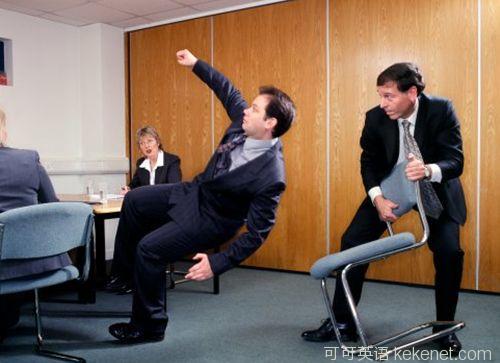
8、Inattentiveness
8、不專注
If you’re always distracted—a bad habit that plenty of employees possess—you might fail to properly assess the culture of the workplace, which can be damaging to your career. Each workplace has its own culture and style, whether it’s the official or unofficial dress code, the social atmosphere, or the official and unofficial hierarchy. Failure to observe the culture and fit in can create tension or mark you as different, and potentially less desirable.
如果你總是分心—很多的雇員都有這樣的毛病—很可能你將無法正確地理解辦公室文化,而這將無利于你的工作。每個(gè)公司都自己的文化和風(fēng)格,包括著裝要求、社交氛圍和等級制度。如果未能正確理解并融入的話,會造成關(guān)系緊張或讓你顯得不夠合群,并可能造成同事、老板對你的不滿。
9、Poor grammar
9、文法不清
When you hear someone using poor grammar, slang, or profanity, it translates into believing that person to be uneducated. Remind yourself that you are not at home, or speaking with friends at a social gathering. Be on point by always assuming that your boss is in earshot.
糟糕的文法,俚語和臟話都是教育程度低的體現(xiàn)。記住這不是在家,也不是和朋友聚會聊天,總是設(shè)想老板就在附近。
10、Lone wolf syndrome
10、不合群
Have a habit of always wanting to do things on your own? That won't work in the office. "While independence is good in some situations or when concentration is needed to get a project done, generally people who are team players experience more success at work. Team-playing involves a lot of positive behaviors including giving credit where it is due (that is, not taking credit for work which a colleague did), helping others when possible, doing tasks that aren’t necessarily in your job description, et cetera. If you’re not seen as a team player, you won’t have the support of your colleagues when problems arise.
喜歡自己單干?在辦公室里是行不通的。有些情況下,獨(dú)立是好事,但是當(dāng)需要群力完成一個(gè)項(xiàng)目的時(shí)候,一般來講,有團(tuán)隊(duì)合作精神的更容易成功。團(tuán)隊(duì)合作需要很多積極的行動,包括適時(shí)給予贊美(也就是不要竊取別人的勞動成果),盡可能幫助他人,幫忙完成不在自己職責(zé)范圍內(nèi)的事等等。如果你不是一個(gè)團(tuán)隊(duì)合作者,那么當(dāng)問題出現(xiàn)的時(shí)候,你的同事也不會站在你這邊的。
11、Temper tantrums
11、脾氣暴躁
If you lose your temper, it is assumed that you cannot work well under pressure or handle responsibilities well. Practice stress reduction techniques like mediation or deep breathing exercises, and never bring personal problems to work.
如果你脾氣暴躁,那么這說明你在壓力下不能正常工作,不能很好地承擔(dān)責(zé)任。可以使用一些減壓技巧如冥想或者深呼吸,并永遠(yuǎn)不要把個(gè)人問題帶到工作上來。
12、Inefficiency
12、低效
Bad habits like disorganization, wasting time, and being too talkative can make you an extremely inefficient worker. You may not realize it, but many of your co-workers are there to work, not socialize, and they may not want to be rude to you by breaking off from personal conversations. You don’t want to become the person your colleagues avoid working with because of these bad habits. Keep the water cooler talk to a minimum, keep your desk organized and don’t spend too much time on non-work-related tasks.
雜亂、浪費(fèi)時(shí)間、話多的壞習(xí)慣讓你效率底下。你可能沒有意識到,但是你的同事是來工作的,不是社交的, 他們也不想不禮貌地中途打斷和你的交談。誰都不想因?yàn)檫@些壞習(xí)慣成為同事們害怕共事的人。盡量減少閑聊,保持桌子整潔,并且不要在和工作無關(guān)的事情上浪費(fèi)過多的時(shí)間。
13、Speaking without thinking
13、說話不經(jīng)過大腦
If you’ve got ‘foot-in-mouth’ syndrome, you must control it in the workplace. Saying something inappropriate in a meeting or in an e-mail can be detrimental to your career.
如果你有“說話不經(jīng)大腦”的毛病,在辦公室里要有所控制。會議或郵件中的不合適的話會對你的職業(yè)生涯產(chǎn)生致命的打擊。
14、Lack of manners
14、不禮貌
When you ask for something, say ‘please.’ When someone gives you something, say ‘thank you.’ If you don’t know someone, introduce yourself. If you need to interrupt someone, say ‘excuse me.’ Manners are important, so don’t be rude. And above all, if you don’t have something nice to say…don’t say anything at all.
如果你想要什么,不要忘了“請”。當(dāng)別人給你東西的時(shí)候,記得說“謝謝”,如果你認(rèn)識別人,要自我介紹。需要打斷別人的時(shí)候,要說“不好意思”。禮儀是很重要的,要有禮貌。還有最重要的是,當(dāng)你想不到什么漂亮的話的時(shí)候,就干脆什么也別說。











